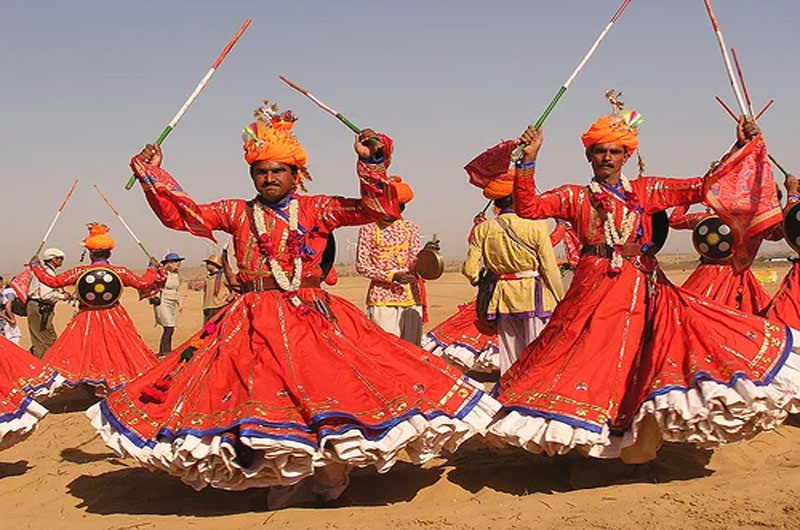
Festivals of Rajasthan: A Cultural Extravaganza of Color and Tradition
Rajasthan’s festivals are a testament to its rich cultural heritage, deep-rooted traditions, and vibrant community life. Each festival, with its unique customs and celebrations, offers a glimpse into the colorful and dynamic heritage of this western Indian state.
1. Pushkar Camel Fair
Time of Festival
- Celebrated in November, during the Kartik Purnima.
Specialty of the Festival
- One of the world’s largest camel fairs, featuring camel races, trades, and beauty contests.
- Includes cultural performances, folk music, dances, and crafts.
- Attracts tourists from around the globe for its vibrant atmosphere and religious significance.
Locality of the Festival
- Celebrated in Pushkar, near Ajmer.
Nature of the Festival
- Cultural, religious, and commercial.
- Emphasis on livestock trading, cultural heritage, and religious rituals.
- Features camel trading, cultural performances, and religious activities.
2. Jaipur Literature Festival
Time of Festival
- Celebrated in January.
Specialty of the Festival
- Known as the “Greatest Literary Show on Earth,” attracting writers, thinkers, and book lovers.
- Features readings, discussions, and debates on various literary and cultural topics.
- Hosts renowned authors, poets, and artists from around the world.
Locality of the Festival
- Celebrated in Jaipur, the capital city of Rajasthan.
Nature of the Festival
- Cultural and intellectual.
- Emphasis on literature, arts, and intellectual discourse.
- Features readings, panel discussions, and cultural performances.
3. Desert Festival
Time of Festival
- Celebrated in February.
Specialty of the Festival
- A three-day festival showcasing the culture of the Thar Desert.
- Includes camel races, folk music and dance performances, turban tying competitions, and puppet shows.
- Attracts tourists for its unique desert culture and vibrant celebrations.
Locality of the Festival
- Celebrated in Jaisalmer, in the heart of the Thar Desert.
Nature of the Festival
- Cultural and traditional.
- Emphasis on desert heritage, folklore, and community participation.
- Features cultural performances, competitions, and traditional arts.
4. Teej Festival
Time of Festival
- Celebrated in July or August, during the monsoon season.
Specialty of the Festival
- Celebrates the reunion of Goddess Parvati with Lord Shiva.
- Involves women dressing in colorful attire, swinging on decorated swings, and performing traditional dances.
- Includes processions with adorned idols of Goddess Teej and community feasts.
Locality of the Festival
- Celebrated across Rajasthan, with major events in Jaipur.
Nature of the Festival
- Cultural and religious.
- Emphasis on marital bliss, womanhood, and monsoon celebrations.
- Features traditional dances, processions, and festive gatherings.
5. Gangaur Festival
Time of Festival
- Celebrated in March or April, following Holi.
Specialty of the Festival
- Dedicated to Goddess Gauri, celebrating marital fidelity and harvest.
- Involves women decorating their hands with henna, dressing in traditional attire, and carrying idols of Gauri in processions.
- Includes rituals, songs, and dances performed by women.
Locality of the Festival
- Celebrated across Rajasthan, with significant events in Jaipur, Udaipur, and Jodhpur.
Nature of the Festival
- Cultural and religious.
- Emphasis on marital devotion, fertility, and community bonding.
- Features processions, rituals, and traditional performances.
6. Diwali
Time of Festival
- Celebrated in October or November.
Specialty of the Festival
- Known as the Festival of Lights, marking the return of Lord Rama to Ayodhya.
- Involves lighting oil lamps, fireworks, and special prayers.
- Homes are decorated, and community feasts are organized.
Locality of the Festival
- Celebrated across Rajasthan, with major events in cities like Jaipur, Udaipur, and Jodhpur.
Nature of the Festival
- Religious and cultural.
- Emphasis on light, prosperity, and family bonding.
- Features lighting of lamps, fireworks, prayers, and feasts.
7. Makar Sankranti
Time of Festival
- Celebrated on January 14th.
Specialty of the Festival
- Marks the transition of the sun into the zodiac sign of Capricorn (Makara).
- Involves kite flying, community feasts, and traditional games.
- Special sweets made from sesame seeds and jaggery are prepared.
Locality of the Festival
- Celebrated across Rajasthan, with major kite flying events in Jaipur and Jodhpur.
Nature of the Festival
- Cultural and seasonal.
- Emphasis on the harvest season, community bonding, and joy.
- Features kite flying, traditional rituals, and feasts.
8. Holi
Time of Festival
- Celebrated in March, marking the arrival of spring.
Specialty of the Festival
- Known as the festival of colors, involving playful throwing of colored powders and water.
- Features traditional songs, dances, and community feasts.
- Symbolizes the victory of good over evil and the end of winter.
Locality of the Festival
- Celebrated across Rajasthan, with major events in cities like Jaipur, Udaipur, and Pushkar.
Nature of the Festival
- Cultural and religious.
- Emphasis on joy, community bonding, and the celebration of spring.
- Features color throwing, dances, music, and feasts.
9. Urs Festival
Time of Festival
- Celebrated in May or June, marking the death anniversary of Sufi saint Khwaja Moinuddin Chishti.
Specialty of the Festival
- A major Muslim festival attracting pilgrims to the Ajmer Sharif Dargah.
- Involves night-long qawwalis (devotional songs), prayers, and community feasts.
- Highlights the Sufi traditions of peace, love, and brotherhood.
Locality of the Festival
- Celebrated in Ajmer, at the Dargah of Khwaja Moinuddin Chishti.
Nature of the Festival
- Religious and spiritual.
- Emphasis on devotion, Sufi traditions, and community service.
- Features prayers, qawwalis, and communal meals.
10. Marwar Festival
Time of Festival
- Celebrated in October.
Specialty of the Festival
- Dedicated to the heroes of Rajasthan, celebrating the culture and history of the Marwar region.
- Includes folk music and dance performances, camel shows, and traditional sports.
- Attracts tourists for its vibrant cultural displays and historical significance.
Locality of the Festival
- Celebrated in Jodhpur.
Nature of the Festival
- Cultural and historical.
- Emphasis on heritage, folklore, and community participation.
- Features cultural performances, traditional sports, and fairs.
11. Nagaur Cattle Fair
Time of Festival
- Celebrated in January or February.
Specialty of the Festival
- A large cattle fair featuring the trading of camels, bullocks, and other livestock.
- Includes traditional dances, music, camel races, and tug-of-war competitions.
- Attracts farmers, traders, and tourists for its unique rural charm.
Locality of the Festival
- Celebrated in Nagaur.
Nature of the Festival
- Cultural and commercial.
- Emphasis on livestock trading, rural traditions, and community bonding.
- Features livestock trading, cultural performances, and competitions.
